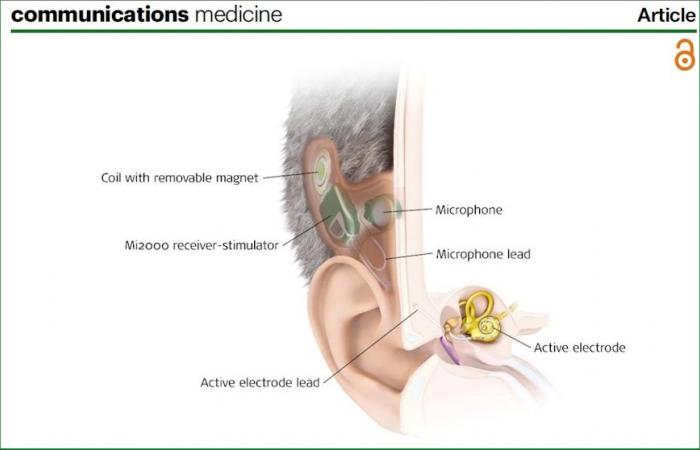A first scientific article* published in the journal Communications Medicine studies the benefits, adverse effects and results of totally implantable implants (totally implantable cochlear implant, TICI), developed by Med-El.
This analysis was carried out on patients implanted at the University Hospital of Liège in Belgium and at the University Hospital of Munich, in Germany, over a period of 52 weeks after surgical intervention. Of the 6 people concerned, suffering from severe to profound bilateral hearing loss and not having obtained sufficient benefit from conventional hearing aids, 4 were implanted on the left, 2 on the right.
Adverse events appeared after the operation: around fifteen during the follow-up period, including one serious (infection at the implantation site), which could be resolved. From the point of view of the safety of fully implantable implants – a central point in this first study – the authors of the study indicate that it is comparable to that of conventional implants.
Regarding the effectiveness of ICT, patients were subjected to speech perception tests (monosyllables in quiet and speech in noise). The scores they obtained were comparable to those of patients using implants with external audio processors.
-The study was based on proven tools to assess the benefits for patients, classic public health and implant questionnaires (HUI3, SSQ-12, HISQUI-19, NCIQ). 4 out of 5 participants used their TICI most of the time without an external audio processor (they had the option of adding one or not, at their convenience). And they have overall reported high profit since their implementation. Satisfaction scores have been increasing over time.
This preliminary study concludes that ICTs are useful as a new treatment option for severe to profound hearing loss. The low number of implanted patients, however, calls for subsequent analyzes to confirm or refute the initial findings.
*Rehabilitation of human hearing with a totally implantable cochlear implant: a feasibility studyPhilippe Pierre Lefebvre, Joachim Müller, Gerhard Mark, Florian Schwarze and Ingeborg Hochmair. Communications Medicine, January 2025






